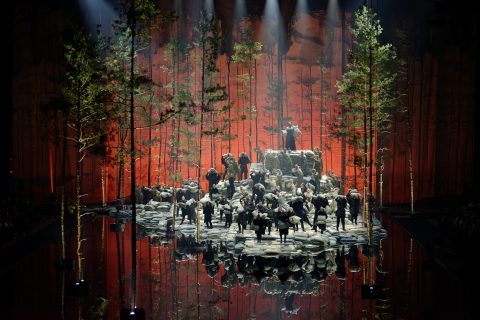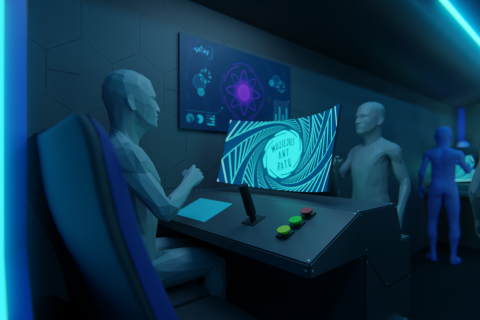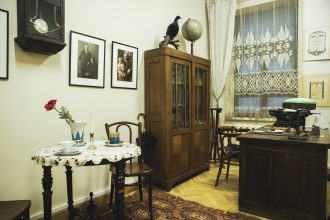If I had to choose only one person, a person from Kaunas, whom to call the symbol of Kaunas – the European Capital of Culture that has been taking place for seven years (now we can say “took place”) I would choose Sandra Karnilavičiūtė. This young woman is simply the ideal symbol of a vibrant inner change. Visually, nothing seems to be different. She is the same, with the same curly hair, questioning and listening eyes, but much more herself.
I remember her since she participated in the Kaunas Challenge youth program, which presented the city for high school students as a blank page and gave them various artistic and scientific tools to turn that page into something. From fashion shows to self-publishing, board games and photography series. As far as I have experienced, all the ideas were implemented at a much higher level than what we usually call “school projects.”
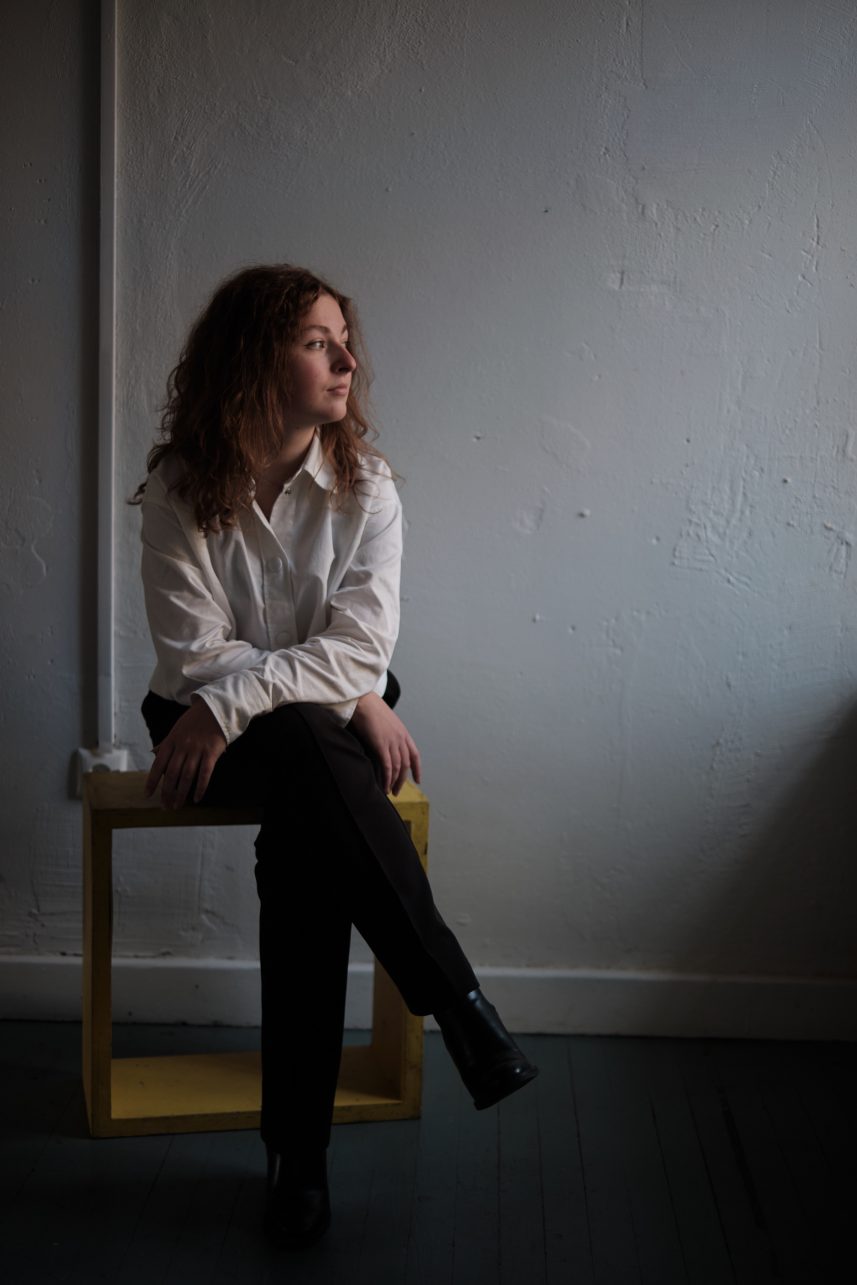
I didn’t realize how Sandra and I started to correspond over work matters, and I like to send her a like-minded heart emoji on Instagram, where she shares her work and academic achievements as well as what they demand of her. Now she lives, works and studies in Vilnius and I am a bit sad about that but only a little because I also ran away to the capital right after graduating from high school. At the time, I thought that I moved there forever. But Sandra is here on the weekends because she is the mentor of Kaunas Challenge.
Sandra let’s start with your school experiences.
OK. I graduated from Vytautas Magnus university Rasos Gymnasium and before that I attended Žiburys secondary school in Aukštieji Šančiai, which was later closed down. I was lucky to have had the opportunity to feel a bit of that school’s spirit.
What was special about it?
Mostly the fact that it is now gone, and we were one of the last generations to enjoy it. The school itself did not have anything special. It had neither a vibrant history, nor traditions. What stuck with me the most was our class teacher, the Lithuanian language teacher, who was feared by many because she was very strict. But she really loved and protected our class. I remember that in the fifth grade, we had to correct the tenth graders’ essays and in the sixth grade we were better than twelfth graders at stressing words. She also read faces well. After I transferred to the gymnasium, I would take a class photo to her (we were neighbors) and when she glanced at it, she could tell everything about those people and their lives.
And what is the connection between Vytautas Magnus university Rasos Gymnasium and Vytautas Magnus University?
It seems that in my time it was just a formality. At first, the university invited high school students to attend open lectures, now the name provides nothing but prestige. Ah, there were university and non-university classes, I studied at a former one. I liked it there. It was a bit of an American roller coaster of growth. I was both the class elder and the president. We organized events and had to fight the established order. I had a nice adolescence and I still keep in touch with my classmates.
You were among the first participants of the Kaunas 2022 program for schoolchildren Kaunas Challenge…
Yes, back in the eleventh grade. When I started attending that program, I wanted to invite my classmates, but the vice principle would say, “Don’t lure the kids away from school” [laughs].
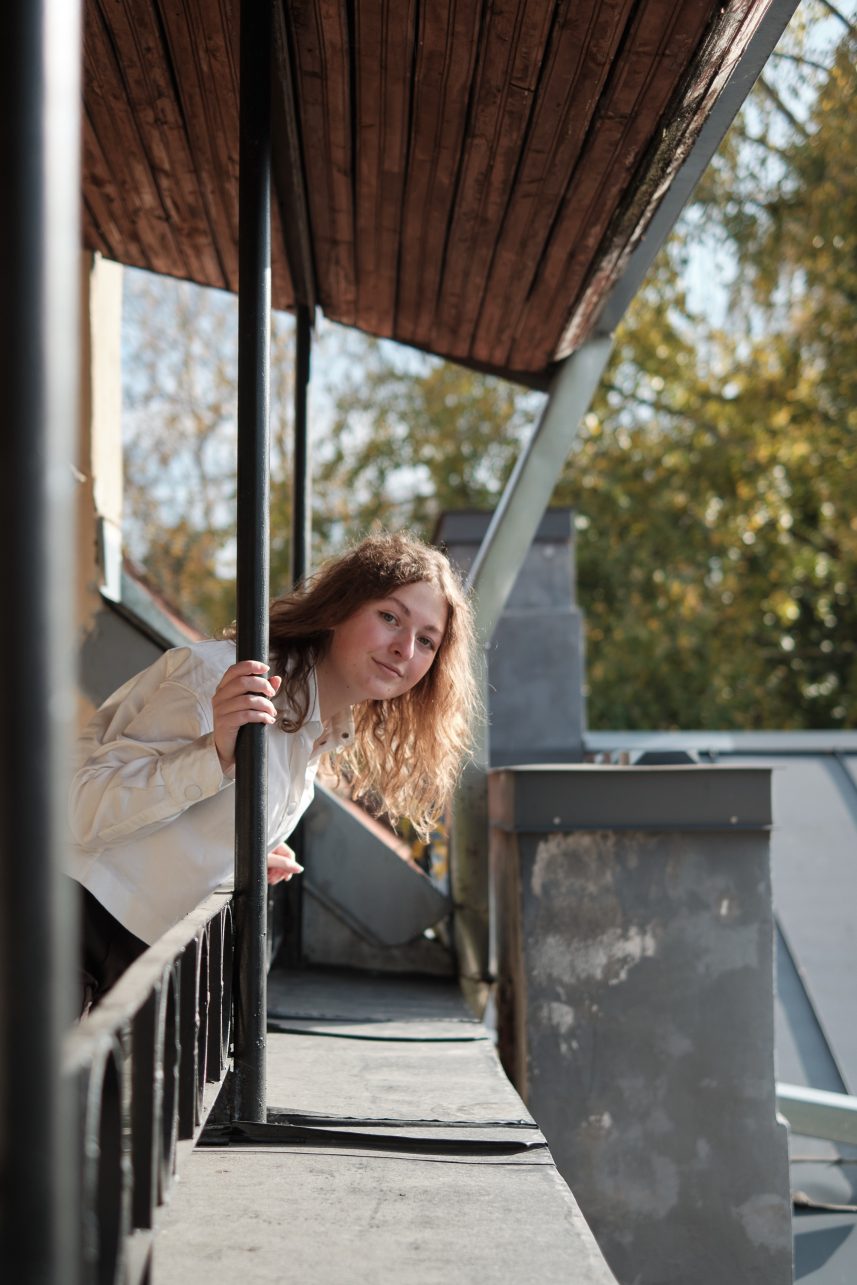
Why did you need such a program? It’s nice to just chill on Saturdays, no?
This question can be answered by a meme of my classmates (we would make them about each other). There was a quote next to my photo, “I will participate.” I would always repeat this word or, for example, if no one raised their hand during class – I would. If something needs to be organized, done, I will gladly do it. Now, maybe I’m not 100 percent like that, but I have this trait. So, it’s not like I really needed the Kaunas Challenge, simply a friend from another school told me about a program that her teacher showed her, where one could register. I quickly did it without even knowing exactly what it was about. By today’s standards, I might not even have gotten into the program. It was a trial version of the Kaunas Challenge, eve before Kaunas won the title of the European Capital of Culture.
It seems to me that teachers and lecturers really like participants like you because they need to put less effort into motivating and building interest in them.
I always really enjoyed learning and I usually got along well with my teachers. If I didn’t understand something, I wasn’t afraid to ask. I have a sister who is five years younger, she is now in the eleventh grade. I remember in the summer I used to play school from 8 o’clock in the morning, I taught her to read and count. But in gymnasium, I decided that I don’t like it anymore, that, well, everyone here is proud of their grades, they realize their value only through a good grade. There was a phase when I wanted to prove that I could get a 7 in physics without studying, and someone would study hard and get an 8. I just loved testing the limits.
And about the attitude of the teachers… I remember the graduation day. The Lithuanian language teacher, who liked me, asked me what I would do next. I said I don’t exactly know what, but I had already gotten a job. I had just received an invitation to join Kaunas 2022. She accepted my statement very skeptically and told me that I was very naive because there will always be someone better, prettier and smarter to replace me and all you have now is just an illusion. I was upset, of course, I did not understand her position. I thought she didn’t see what I saw, and she didn’t appreciate me. I took the certificate and left. I wondered how much of that was an illusion, but I decided that as long as it inspires me, I will stay. This illusion turned into a 4-year journey being part of the European Capital of Culture team.
You know, when I think of today’s high school graduates, the first thing that comes to mind is confusion and frustration over exams. It’s like Palanga’s businessmen and a bad summer. I think that my generation did not really worry that much about the grades. Where do you think the commotion and fear is coming from? Do they exist or it’s just the headlines?
Yes, it exists. I had friends in my class who spent more time on their textbooks than eating or doing something else. They were hurting a lot when they didn’t get the best grade. If it is not the maximum, then it is not good enough. Of course, it inspires effort, it shows that those people are stubborn and want to do everything very well. But I didn’t delve into the reasons for that.
And now I still don’t know if it’s just a desire to achieve a goal, to enter some very good university, or just a fear of parents’ anger. I think we pay a lot of attention to how others see us and what others will think, which is why a grade, or an evaluation is so important. But I got my first and very good job where nobody cared about my grades.
And you also managed to finish university?
Yes, I have received a bachelor’s degree. True, I worked part-time, although I still had all kinds of projects, and I also worked as a waitress. I studied communication and information management technologies at the Kaunas University of Technology. This is the first study program that lasts three years. Then I took a year off, and now I’m studying for a master’s degree in public relations. And in addition, I always look for something, show an interest in one thing or another.
What was your role in Kaunas 2022?
The position I started in, did not change. I was a coordinator or manager of the Kaunas Challenge. Now also a mentor. By the end of my bachelor’s degree, I wanted something more in line with my specialty, so I joined the communication team as a project manager. I wrote newsletters, managed websites, and contributed to events. By the way, the studies were quite practical and useful for me. At the university, even Kaunas is Full of Culture was one of the tasks.
Why did you want a break before your master’s degree?
It was a spontaneous decision. I wanted to see what kind of thoughts I would get if I would be simply working like a normal person. And the thought that came was that I really wanted to study. I wanted an academic community, to meet other people. I think I am still very youthfully driven, and I hope that I can contribute at least a little to changing the world. I know that I will not change it completely, but knowledge is one way to get as close to that as possible.
Let’s also talk about the Kaunas Challenge program. Its final highlight was Audra – a festival this city has never seen before. What did this program give you?
Acquaintances, of course. It’s always interesting to see how alumni of the program are doing, because in reality, the people who took part in the challenge are continuing to work on something good. And let’s not forget all the contacts! After all, we collaborated with theatres and museums. These were unique opportunities for very young people. For example, we, random eleventh and twelfth graders, were admitted to the Pienocentras building because we decided to throw an event there. It gave us self-confidence and, I would also say, stress management, taught us how to tolerate failure. Now, in my studies and projects, I notice that people, who organize something for the first time, are full of anxiety. They are afraid of failure. And I look at things differently. I am not afraid to try because so what if you fail? I will learn a lesson for the future. I am not afraid to look stupid. If I need specific information, I will get it.
Why is this not taught in school?
The first thought that came to mind is that maybe teachers don’t always know this themselves. In addition, most people focus on a very specific thing rather than on the whole or soft power. Perhaps some are afraid of losing authority. Not everyone realizes that a teacher is also a person. This profession is very depersonalized. At school, we generally don’t have time or are afraid to question what is happening to us. And when you come to a specific program, where people gather with the goal of doing precisely that and gaining skills, things are very different. However, I believe that the school of the future will have to focus on soft skills: responsibility, leadership, creativity and the like.
Now you are a mentor. Do you see the participants of the Kaunas Challenge as a younger generation?
It’s hard to say because every generation of the program is different. Some are madcaps full of strange ideas, others have spent 2 years in Zoom, and yet others are chatty and full of questions. Yes, there is already an age difference, but I don’t know if I can now objectively compare myself to them. This program attracts one type of people! But I can share one interesting thing. The participants of the challenge create their own rules for how they will spend their time here. And this year, for the first time, a new rule was introduced: Kaunas Challenge is a phone-free zone. I don’t know how it will work out, but the idea is good.
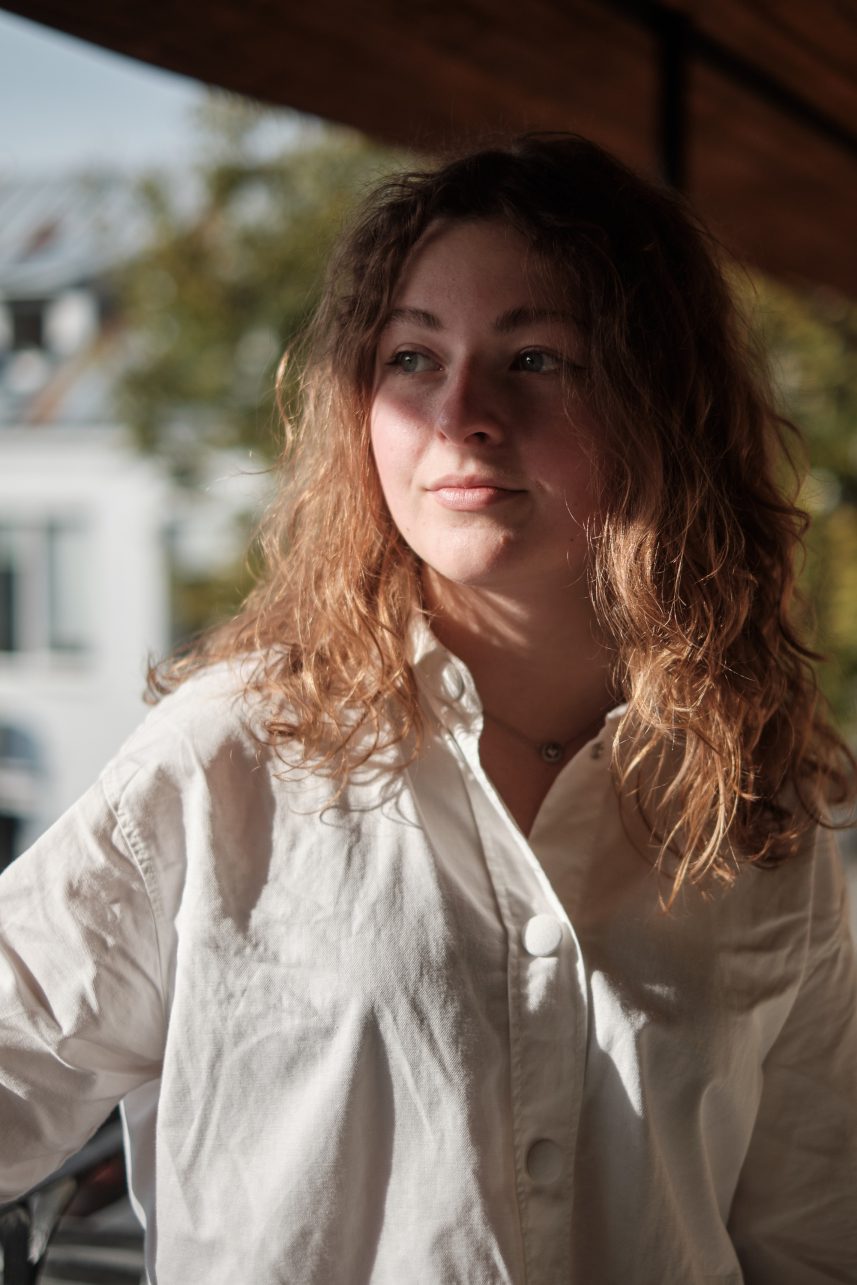
What do you think you teach those younger than you?
Consciously or not, about the importance of self-confidence and also how to behave as mentors. With another alumna Vaiva Marija Bružaitė, the organizer of Audra, we are a team that brainstorms at night. Our example shows how and why teamwork is important. In addition, we give responsibility and the final say to the program participants. They need to understand that they are not preparing the assignment for me, it is not a yet another homework. Of course, you have to push them, especially when things don’t go so well at first or when they are afraid to start. We still encourage them to at least give it a try and see what works and what doesn’t, what they like or don’t like. The participants do all that in a safe space and a supportive community, where it is not that scary to fail at the first attempt. Then they know what to do to prevent it! That’s how we try the first half year of the challenge and then they generate ideas by themselves, and we follow them around with questions like what is the main idea, what is your goal, and is it relevant?
And what is the fundamental difference between a teacher and a mentor?
It seems to me that a mentor is more of a navigator, a mediator between the student and the desired result. They are more of a leader and a therapist at the same time. The teacher teaches their subject, the student solves the tasks, which are later evaluated. Of course, it all depends on the person, the teacher can also be a mentor if they have any ideas and tools that they want to share with a student.
Which Kaunas Challenge project and its final result shocked you the most?
Komoda is a platform for young fashion designers that talks about culture through fashion. I feel like at first, the team did not have a clear idea whether it will be an exhibition or an event. Last year, the show took place during Per_kūnija festival near M. Žilinskas Art Gallery and when I was watching the event at the Vytautas the Great War Museum Garden during Audra festival, I caught myself snapping pictures left and right and sharing the snippets from the event. It was so huge, it attracted so many people, and was of prime quality! I would have never said that it was organized by people who were graduating from high school.
What would you wish for the tenth-grader Sandra?
I would say it’s more likely that a tenth grader me would wish something to the current me; she inspires me more sometimes. I think she would say, “Don’t lose yourself and keep moving forward fearlessly – it pays off.”
And for my younger self I would wish this, “You will learn by doing. You will learn everything you want. Just don’t forget to always have yourself on the to-do list.”

